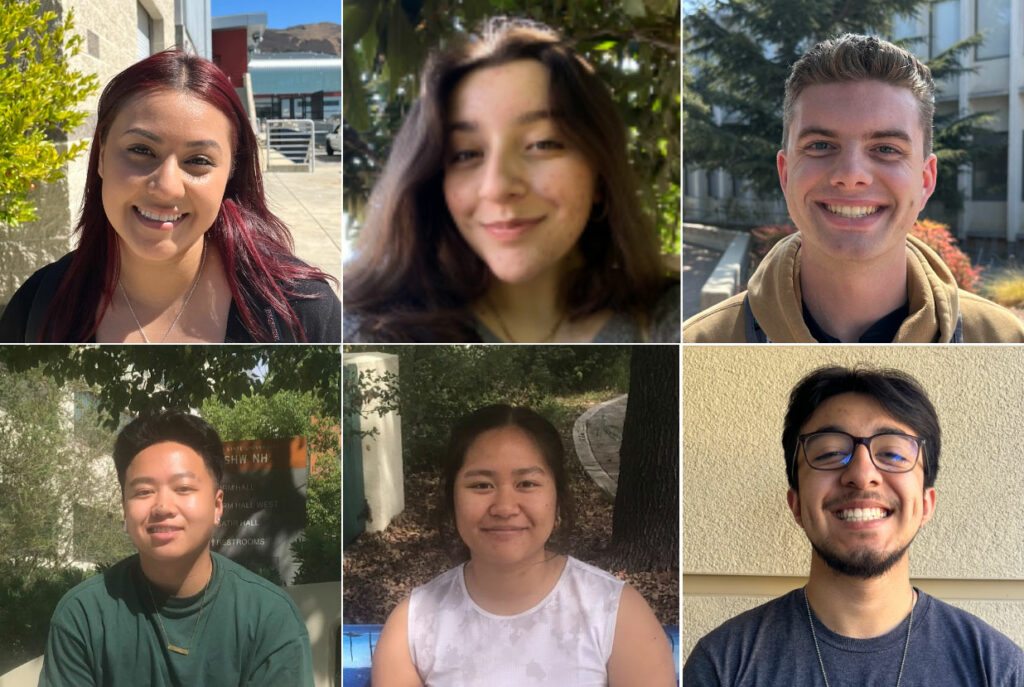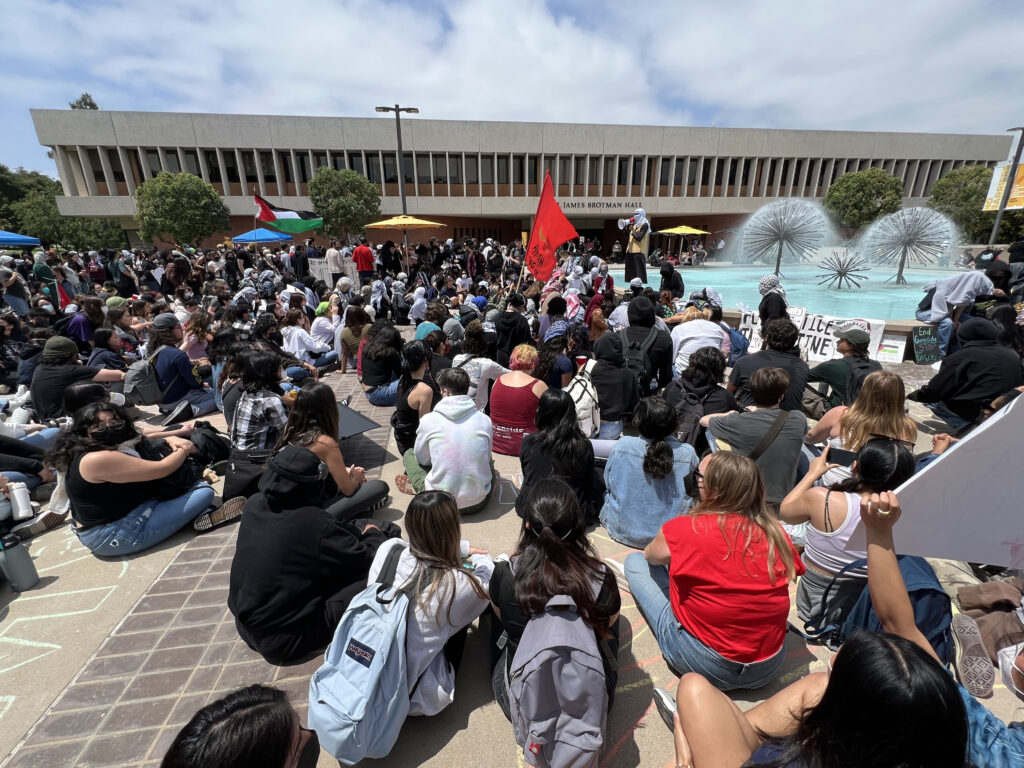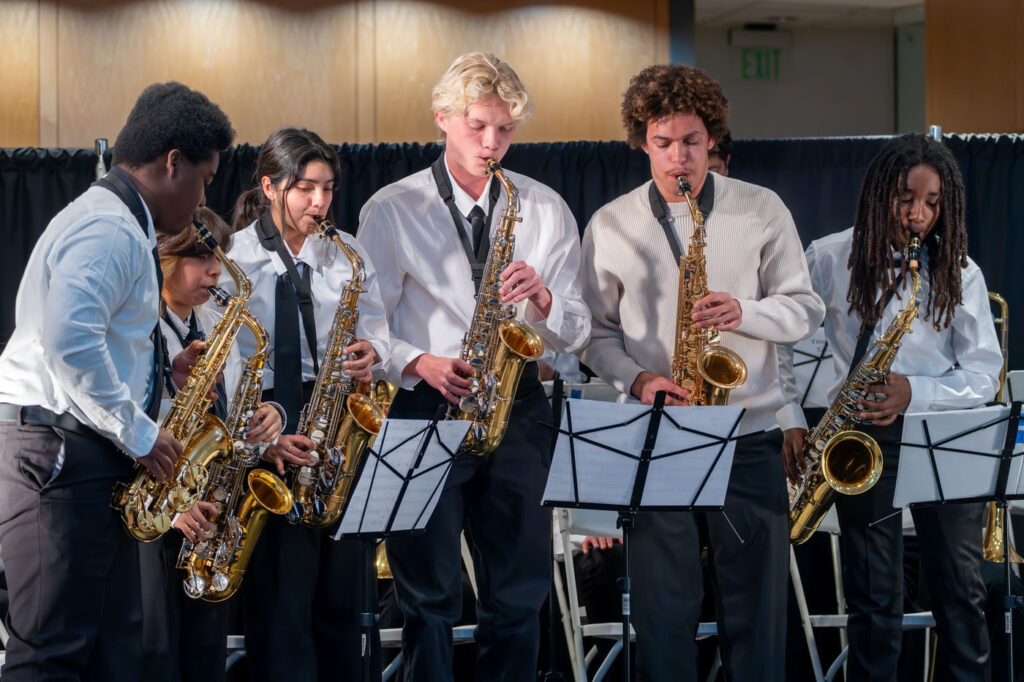
A teach-in on Palestine at Cal State Long Beach on May 2, 2024.
Credit: Courtesy of Ben Huff
California State University, Long Beach is facing accusations that a policy limiting amplified sound on campus violates free speech rights and has been selectively enforced to single out faculty members who criticized the university.
The American Civil Liberties Union of Southern California last Thursday sent a letter to campus leaders on behalf of two faculty members it said received notices warning that they violated the school’s sound amplification policies during a teach-in about Palestine last spring.
Cal State Long Beach regulations for devices like megaphones and microphones “are unconstitutional as written, and there is good reason to suspect that warnings … may have been issued because of disagreement with the professors’ political speech,” ACLU attorney Jonathan Markovitz wrote.
Cal State Long Beach spokesperson Jeff Cook said in a statement that the university respects “the perspectives expressed in the letter from the ACLU but (disagrees) with several of the characterizations made. As our review of the letter continues, we also reaffirm that campus policies related to ‘Time, Place and Manner’ are viewpoint-neutral.”
The confrontation at Cal State Long Beach highlights the potential for backlash as universities around the country place a new emphasis on rules around how, where and when people can assemble on their campuses this fall, a reaction to a wave of pro-Palestinian protests last spring. University officials frame revamped guardrails as promoting the peaceful exchange of ideas in continuation of past practices, but critics argue the restrictions will chill free speech.
The California State University Chancellor’s Office last month debuted a systemwide time, place and manner policy in response to legislation requiring schools in both the Cal State and University of California systems to notify students of free speech rules on their campuses at the start of the academic year.
Cal State Chancellor Mildred García additionally notified campus presidents in an Aug. 27 letter that activities like forming encampments and occupying buildings “are also prohibited by law and by systemwide directive.” García’s letter has sparked pushback from the California Faculty Association, which argues the university system is imposing new standards of employee conduct unilaterally, failing to give the faculty union an opportunity to bargain.
The ACLU letter was sent on behalf of professors Sabrina Alimahomed-Wilson and Jake Alimahomed-Wilson, who in May co-wrote an article with four other Cal State Long Beach faculty members condemning the university’s ties to Boeing and other defense contractors.
“My understanding is that, while many faculty members used amplified sound while participating in the teach-in that provides the ostensible basis for the warning emails, the only faculty members who received these warnings (the Alimahomed-Wilsons, Araceli Esparza, Steven Osuna, Azza Basarudin) were the co-authors of the article,” Markovitz wrote. “I hope that this is mere coincidence, but the correlation is at least notable.”
The letter asks the university to stop enforcing its sound amplification restrictions and repeal them until they can be amended “to comport with constitutional requirements.”
Looking back to the spring
Both the university’s current sound amplification policy and the policy in effect last spring require advance permission to use any kind of amplification. University policy also sets a decibel limit and specifies times and places where amplification is permitted.
The matter discussed in the ACLU letter stems from a May 2 teach-in held at the campus.
The student-organized demonstration started with a march from the school’s upper campus to its lower campus, where a group of hundreds gathered for a teach-in outside an administration building, the five professors named in the ACLU letter said in a group interview. They recalled that roughly eight to 12 speakers shared remarks using a megaphone or a microphone.
“The whole time, we had mic and megaphone problems,” Osuna said. “It wasn’t very loud. So that’s the part that’s really funny to me – we all kept on trying to tell people, ‘Can you hear us? Can you hear us?’”
Sabrina Alimahomed-Wilson, Esparza and Basarudin shared remarks about why Palestine is a feminist issue, while Jake Alimahomed-Wilson and Osuna gave a talk describing the university’s connections to Boeing. The latter presentation became the basis for an opinion piece the five professors and a colleague published on May 20 in the website Mondoweiss, which argued that the university’s close relationship with Boeing makes it complicit in the violence in Gaza.
The five professors said that on Aug. 19, the first day of the fall term, they each received emails notifying them that they had violated the time, place and manner policy and would risk formal written reprimand or other disciplinary action if they did not comply with it in the future.
“They waited all this time to send us this message on the first day of the semester,” Osuna said. “It’s kind of letting us know, ‘We have our eyes on you.’ That’s the feeling.”
Osuna said that a similar warning email sent to a sixth person was rescinded because there wasn’t evidence to show they had used a microphone.
A free speech argument
Markovitz argued in the letter addressed to Associate Vice President Patricia A. Pérez last week that Cal State Long Beach’s amplified sound policy is unconstitutional because regulations affecting speech must be narrowly tailored.
While some limits on amplified sound may be legitimate, he wrote, it is “clearly impermissible to require advance permission for any use of amplification anywhere on campus.” He argued that the campus’ volume limitations could be used to prohibit shouting or chanting without amplification, even if that is not the university’s intention. And he said the time limitations are “poorly written and unclear,” making it difficult to decipher when and where amplification is allowed.
“The policy’s lack of clarity is a serious problem in its own right, because it makes it impossible for members of the University community to know when they might be in violation of the policy, or when they will be denied permission for amplified sound,” Markovitz wrote. “The risk of arbitrary enforcement is especially pronounced because the policy provides no guidelines indicating when the required requests for advance permission will be granted or denied.”
Markovitz’s letter also expressed concerns that the university has not enforced its sound amplification consistently, but rather is using the policy to discriminate against faculty members based on their political views.
“The inference of viewpoint discrimination or retaliation is bolstered by my understanding that faculty have regularly used amplified sound at union rallies without obtaining advance permission, and without receiving warnings of (time, place and manner) violations later on,” Markovitz wrote. “Again, I hope that the apparent inconsistent application of the university’s amplification has been merely an honest mistake, but I am concerned that hope may not be justified.”
‘A fabric of our university’
Sabrina Alimahomed-Wilson said she and other faculty who received the emails have used megaphones at previous teach-ins and protests, including an event following the 2020 murder of George Floyd by Minneapolis police.
“Teach-ins have been a fabric of our university,” she said, “and have never been policed in these ways.”
“Our students see this, too,” Alimahomed-Wilson added. “So what does it mean when all our students are like, ‘Oh, those professors have gotten doxed over this. Now, those professors are getting criminalized over this. They’re getting charged.’”? I think the impact is really chilling.”
Alimahomed-Wilson and her colleagues said their support for student protesters is an extension of their duties as faculty members: research, teaching and service to students.
“We teach our students about justice, about the military-industrial complex, about settler-colonialism, and if we don’t speak out against what is happening right now, we’re not doing our job,” Basarudin said.







